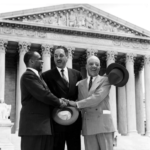| By Greg Flakus, VoA News
They have been called the Greatest Generation for what they did to stop the Nazis in Europe and the Imperialist Japanese army in Asia and the Pacific. Veterans of World War II are said to be dying at the rate of 1,000 a day. Among those still with us are a few members of Native American Indian tribes, whose unique languages played a crucial role in the war effort. VOA correspondent Greg Flakus sought out one of them in Pine Ridge, South Dakota recently and filed this report about the last of the Lakota Code Talkers.
September 27, 2007 – Pine Ridge, South Dakota – The language is Lakota, one of three dialects of the people collectively called Sioux, a tribe of hunters and warriors that once roamed all over the northern plains. The language is divided into three dialects – Dakota, Nakota and Lakota – but any person who speaks one dialect can understand the others. Clarence Wolf Guts is an 83-year-old Lakota warrior whose ability to speak his native language played a role in defeating the Japanese in World War II. “I helped win the war, I helped, me and my buddies,” he said. With a surname that many non-Indians in the US military found amusing, Clarence Wolf Guts took his fair share of teasing, but he soon found himself assigned with other Lakota speakers to a special unit. The so-called code talkers would send and receive messages in their language. Similar programs were operated by the U.S. Marines using mainly Navajo speakers. The Japanese were never able to understand the messages.
It was dangerous work, often carried out near the front lines, where Clarence says he saw plenty of combat. “We got shot at and we did some shooting ourselves. You know it is not easy shooting at another human being,” he said. Until a couple of years ago most people who knew Clarence Wolf Guts on the Pine Ridge reservation had no idea that he had been a code talker because he seldom spoke about it. Former Pine Ridge neighbor Charles Trimble now directs the Institute of American Indian Studies at the University of South Dakota.
“We did not know it,” he said. “I did not know until a couple of years ago when I was reading something. He never talked about it. A lot of times veterans would come home, especially during World War II and you would very seldom, except when two or three got together, hear them talk about that-about the horrible things that happened around them or anything else.” It would be difficult to form a Lakota code-talker unit today because most of the estimated 8,000 speakers are elderly people and few young Lakotas can speak the language fluently. But the university offers classes in Lakota for both Indian and non-Indian students and Trimble says this helps keep the language alive. “I think it is important,” he said. “I think it is beautiful and I think it helps a person and, certainly, it keeps the tribe alive, as a tribe.” Trimble says the story of the Lakota code talkers is an important part of the heritage that binds tribal members together. “There are benefits to knowing you are an Indian and accepting it, being an Indian and being proud of it and understanding it,” he said. Clarence Wolf Guts now lives in a retirement home in Pine Ridge. He says seeing the people of his country healthy and happy is the greatest reward he gained from his service in the war. “When I see people laughing and having a good time I realize why we were over there,” he said. “We done it for the people and if they are happy, then I am the happiest person alive.” For many years after the war the code talkers were largely forgotten. But after military documents were declassified in the 1990s and a book came out about the Navajo code talkers, historians and news reporters sought out the surviving code talkers. There had been over a 100 of them from 17 tribes. Most of them have passed on now, but a few like Clarence Wolf Guts remain to tell the story of how they used their native tongue to help win a war.
Flakus report (mp3) – Download 951k |
||||||
|













